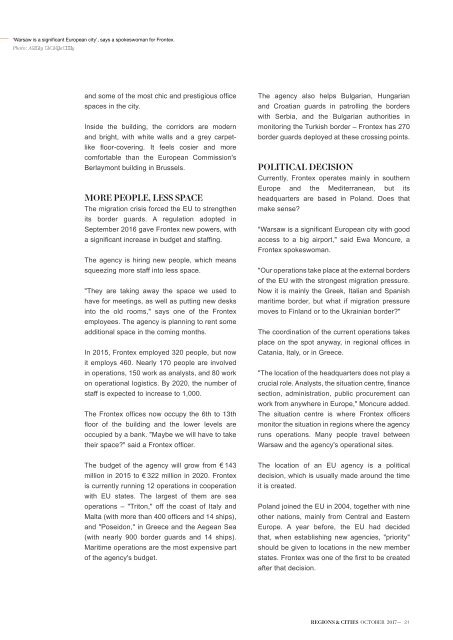Regions & Cities: The EU Agencies Race
EUobserver's 2017 Regions & Cities magazine takes a closer look at EU agencies and the benefits for cities and regions to host them. The UK leaving the EU has prompted a scramble for the European Medicines Agency and the European Banking Authority among most of the remaining member states. But what makes a city competitive? Which cities stand a good chance to become the new hosts? And what do EU agencies bring to the local economy?
EUobserver's 2017 Regions & Cities magazine takes a closer look at EU agencies and the benefits for cities and regions to host them. The UK leaving the EU has prompted a scramble for the European Medicines Agency and the European Banking Authority among most of the remaining member states. But what makes a city competitive? Which cities stand a good chance to become the new hosts? And what do EU agencies bring to the local economy?
You also want an ePaper? Increase the reach of your titles
YUMPU automatically turns print PDFs into web optimized ePapers that Google loves.
Photo: Aeey ooyaiy<br />
<br />
spaces in the city.<br />
Inside the building, the corridors are modern<br />
and bright, with white walls and a grey carpet-<br />
<br />
comfortable than the European Commission's<br />
Berlaymont building in Brussels.<br />
MORE PEOPLE, LESS SPACE<br />
<strong>The</strong> migration crisis forced the <strong>EU</strong> to strengthen<br />
its border guards. A regulation adopted in<br />
September 2016 gave Frontex new powers, with<br />
<br />
<strong>The</strong> agency is hiring new people, which means<br />
squeezing more staff into less space.<br />
"<strong>The</strong>y are taking away the space we used to<br />
have for meetings, as well as putting new desks<br />
into the old rooms," says one of the Frontex<br />
employees. <strong>The</strong> agency is planning to rent some<br />
additional space in the coming months.<br />
In 2015, Frontex employed 320 people, but now<br />
it employs 460. Nearly 170 people are involved<br />
in operations, 150 work as analysts, and 80 work<br />
on operational logistics. By 2020, the number of<br />
staff is expected to increase to 1,000.<br />
<br />
<br />
occupied by a bank. "Maybe we will have to take<br />
<br />
<strong>The</strong> agency also helps Bulgarian, Hungarian<br />
and Croatian guards in patrolling the borders<br />
with Serbia, and the Bulgarian authorities in<br />
monitoring the Turkish border – Frontex has 270<br />
border guards deployed at these crossing points.<br />
POLITICAL DECISION<br />
Currently, Frontex operates mainly in southern<br />
Europe and the Mediterranean, but its<br />
headquarters are based in Poland. Does that<br />
make sense?<br />
<br />
access to a big airport," said Ewa Moncure, a<br />
Frontex spokeswoman.<br />
"Our operations take place at the external borders<br />
of the <strong>EU</strong> with the strongest migration pressure.<br />
Now it is mainly the Greek, Italian and Spanish<br />
maritime border, but what if migration pressure<br />
moves to Finland or to the Ukrainian border?"<br />
<strong>The</strong> coordination of the current operations takes<br />
<br />
Catania, Italy, or in Greece.<br />
"<strong>The</strong> location of the headquarters does not play a<br />
<br />
section, administration, public procurement can<br />
work from anywhere in Europe," Moncure added.<br />
<br />
monitor the situation in regions where the agency<br />
runs operations. Many people travel between<br />
Warsaw and the agency's operational sites.<br />
<strong>The</strong> budget of the agency will grow from € 143<br />
million in 2015 to € 322 million in 2020. Frontex<br />
is currently running 12 operations in cooperation<br />
with <strong>EU</strong> states. <strong>The</strong> largest of them are sea<br />
operations – "Triton," off the coast of Italy and<br />
<br />
and "Poseidon," in Greece and the Aegean Sea<br />
(with nearly 900 border guards and 14 ships).<br />
Maritime operations are the most expensive part<br />
of the agency's budget.<br />
<strong>The</strong> location of an <strong>EU</strong> agency is a political<br />
decision, which is usually made around the time<br />
it is created.<br />
Poland joined the <strong>EU</strong> in 2004, together with nine<br />
other nations, mainly from Central and Eastern<br />
Europe. A year before, the <strong>EU</strong> had decided<br />
that, when establishing new agencies, "priority"<br />
should be given to locations in the new member<br />
<br />
after that decision.<br />
REGIONS & CITIES OCTOBER 2017— 21

















